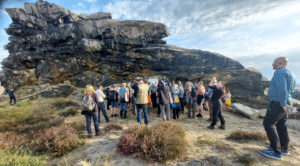INQUA 2112 my: The Whole is Not the Sum of the Parts (pSESYNTH)
The pSESYNTH project, led by Xavi Benito of IRTA, Spain, focuses on building a synthesis database of past human-environmental systems in the Global South. Several online meetings conducted by the team facilitated discussions on how to effectively consolidate varied datasets from different Global South regions, initially focusing on collating multivariate records mostly associated with aquatic and terrestrial environmental change.
Abstract
The project titled “The Whole is Not the Sum of the Parts: Building a Synthesis Database of Past Human-Environmental Systems in the Global South (pSESYNTH),” is committed to fostering international collaboration and advancing paleo-scientific research in the Global South.
At the heart of pSESYNTH lies a profound objective – to establish, articulate, and fortify regional, interdisciplinary teams focused on unraveling the mysteries of past socio-environmental systems in the Global South. Our guiding star is the creation
 of the first-ever multi-disciplinary paleo-database, designed to represent and preserve the invaluable heritage of this diverse and dynamic region. Join us in this journey to uncover the secrets of the past and to build a more sustainable and informed future. Together, we can make history accessible, and our actions today, resonate in the landscapes of tomorrow.
of the first-ever multi-disciplinary paleo-database, designed to represent and preserve the invaluable heritage of this diverse and dynamic region. Join us in this journey to uncover the secrets of the past and to build a more sustainable and informed future. Together, we can make history accessible, and our actions today, resonate in the landscapes of tomorrow.
Objectives:
- Interdisciplinary multiproxy exploration – Delving into the processes that enable us to uncover past drivers of environmental change. This is achieved through an interdisciplinary multiproxy approach, which is organized into three vital themes: paleoecology, paleoclimatology, and archaeology.
- Quantitative analysis of interdisciplinary links – In-depth quantitative analysis of the connections between paleoecology, paleoclimatology, and archaeology. We focus on research questions that possess both generic and specific relevance across the Global South.
- Creating a FAIR database – We aim to disseminate the results through the development of a database that adheres to the FAIR principles (Findable, Accessible, Interoperable, and Reusable), as defined by Wilkinson et al. in 2016. pSESYNTH participants will integrate existing single- and multi-themed databases (including Neotoma, NOAA, PANGAEA, LinkedEarth, CARD, ArchaeoGlobe, and HYDE 3.2) to enrich the novel Global South database.
Project leaders:
- Xavier Benito, Marine and Continental Waters Programme, Institute of Agrifood Research and Technology (IRTA), Spain
- Charuta Kulkarni, India
- Manuel Chevalier, Department of Meteorology, University of Bonn, Germany
- Paula Echeverría-Galindo, Technical University of Braunschweig, Germany
- Ignacio Jara, University of Tarapacá, Chile







